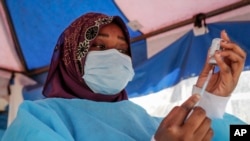On inauguration day, U.S. President Donald Trump signed executive orders that set in motion the country’s withdrawal from the Paris Climate Treaty as well as from the World Health Organization.
While it may be some time before the broader impact of those moves will be clear, Cobus Van Staden, a China-Africa expert with the South African Institute for International Affairs, says one unintended consequence could be a shift in the global balance of power in these international institutions.
“The U.S. withdrawal from the World Health Organization, from the Paris Accord weakens the voice that the U.S. had in those organizations," Van Staden said. "The net effect of many of these orders is to just further make China more central in the relationship with many Global South countries, particularly also in Africa.”
While China may be the world’s largest greenhouse gas emitter, it’s also the biggest manufacturer of green technology products globally, notes Christian-Geraud Neema, from the think tank called China Global South Project.
“When the U.S. withdraws from the Paris Accords, China can rightfully put forward its narrative of being the green technology champion,” Neema said.
During a news conference on Tuesday, Chinese foreign ministry spokesman Guo Jiakun voiced concern about Trump’s decision on the Paris Climate Agreement.
“Climate change is a common challenge facing mankind. No country can stay out of it. No country can be immune to it. China's determination and actions to actively respond to climate change will be consistent," Guo said.
Jean Kaseya, Africa CDC Director-General told Newzroom Afrika on Tuesday that the withdrawl could curtail services for people in Africa.
“My interest is the health of African people, and the U.S. is the main partner that we have in Africa and the U.S. is providing a large spectrum of services to African people," Kaseya said. "And I think it’s time for us to understand the decision that is made and to see how we can overcome this challenge for African people.”
At the same time, Kaseya says he sees opportunities with the new administration to create as he puts it “a win-win for all of us.”
Neema of the China-Global South Project said the U.S. withdrawal from the World Health Organization – which will take a year – could help position China as a leader in global health.
“When it comes to health cooperation, we can also see how much China’s expanding its own influence in Africa, with different medical cooperation it has with different countries,” Neema said.
China has a long record of building hospitals in Africa and sending medical aid ships and doctors to the continent, but Washington’s withdraw could see even more demand for funding and support from Beijing.
Trump has accused the WHO of mishandling the COVID-19 pandemic. He also has said he resents the fact that the U.S. – the WHO’s largest contributor – gives much more money to the organization than China contributes.
“Pretty sad though, think of it," Trump said. "China pays $39 million and we pay $500 million, and China's a bigger country."
In further remarks on Tuesday, the Chinese foreign ministry spokesman said China would “continue to support the WHO in fulfilling its responsibilities, deepen international public health cooperation,” and “strengthen global health governance.”
Bob Wekesa, director at the African Center for the Study of the United States, at the University of the Witwatersrand in Johannesburg, said ultimately, Trump’s orders meant Africa would have to turn elsewhere for help.
“African countries will now eventually have to figure out how to raise their own internal resources for matters to do with help, and if not, kind of rely on Europeans and the Chinese and Indians,” Wekesa said.
Last month, the U.S. announced more than $1 billion in humanitarian assistance to African countries. But Wekesa said with the U.S. pulling out of the WHO, relying less on the U.S. is a lesson that African countries already learned during Trump’s first term in office.





